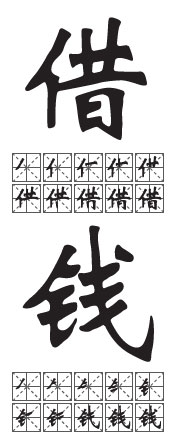Lending advice on borrowing

When it comes to the delicate subject of loans, you may need to learn a lesson or two from these Chinese tips
Your true friends will be there through thick and thin, good and bad - unless you need money. Oh yes, your friends will be there when you want to talk about your colo-rectal surgery or Big Bang Theory fan fiction but the moment you need a loan you'll find them staring at their shoes and kicking the dirt. Nothing kills a good friendship like lending or borrowing cash - but sometimes you have no other choice. Here are some tips on asking for a handout in Chinese without killing your friendship.
The first thing to bear in mind is that you should probably not use the word "money". People prefer to describe their difficulty in a more euphemistic manner; for that there is 手头紧(shǒu tóu jǐn), which roughly means "tight fists". If you don't want to give a specific description about what happened to you, you can go with this all-purpose term:

A: It's hard to explain, but recently my fists have been a little tight. So, I have to come to you for help.
Zhēn bù hǎo yìsi kāikǒu, dànshì wǒ zuìjìn shǒu tóu yǒu diǎnr jǐn, zhǐhǎo zhǎo nǐ bāng máng.
真不好意思开口, 但是我最近手头有点儿紧, 只好找你帮忙.
They may ask:
B: Well, how much do you need?
Nǐxūyào duōshǎo qián?
你需要多少钱?

Say the number and add
"你方便吗 (Nǐ fāng biàn ma)?"
This "Are you convenient?" has at least two meanings: "Do you have enough money to hand?" and "Are you willing to lend it to me?" Regardless, it looks like a yes-or-no question.
A: I need 5,000 yuan. Is that convenient?
Wǒ xūyào wǔ qiān kuài qián. Nǐ fāng biàn ma?
我需要五千块钱. 你方便吗?
B: I just have 3,000 yuan at hand.
Wǒ xiàn zài shǒu tóu zhǐ yǒu sānqiān.
我现在手头只有三千.
A: That will also help. Could you lend it to me now?
Nà yě xíng. Néng xiān jiè gěi wǒ ma?
那也行. 能先借给我吗?
Lending to a friend who is genuinely in need can be like delivering coal on a cold, snowy day, or 雪中送炭 (xuě zhōng sòng tàn). As a general rule, 救急不救穷 (jiù jí bú jiù qióng), that is, you lend financial aid to those in an emergency, but not to those who are perennially in need of money. If you find yourself in the position of the lender facing a not-so-urgent situation, you won't want to say "no". You'll tap-dance around it but you won't want to look like a jerk. For this tactic, some pretexts are necessary.
If you are faced with a true friend whom you really care for, be as generous as you like but remember that, no matter how good of a friend they are, they may be a horrible debtor. When the deadline is due and they don't have your money or a reasonable explanation, things can get very ugly. As we say in Chinese, 欠债还钱, 天经地义 (qiàn zhài huán qián, tiān jīng dì yì. Paying back debts is a mandate of heaven). Still, be gentle.
B: I have a vague recollection that I lent you some money.
Wǒ yǐnyuē ji de hǎo xiàng jiè guò qián gěi nǐ. 我隐约记得好像借过钱给你.
A: Yes, you did. I will return the money tomorrow.
Shì de, wǒ míng tiān huán nǐ.
是的, 我明天还你.
A: No rush. I was just asking.
B ù zháo jí, wǒ jiù shì wèn yī xià.
不着急, 我就是问一下.
Whether you're the lender or borrower, it's always good to pay your debts on time. Remember: 好借好还, 再借不难 (hǎo jiè hǎo huán, zài jiè bù nán. Return what you borrow on time, you'll be welcome to borrow next time).
Courtesy of The World of Chinese, www.theworldofchinese.com
The World of Chinese
(China Daily Africa Weekly 04/21/2017 page23)
Today's Top News
- US plan for arms sales to Taiwan condemned
- China creates 12.1m new urban jobs
- Dialogue constructive way to rebalance trade
- AI needs to be governed wisely to ensure that it is beneficial for future of humanity: China Daily editorial
- China warns about Japan's intended military buildup
- China urges EU to halt anti-subsidy probes






























